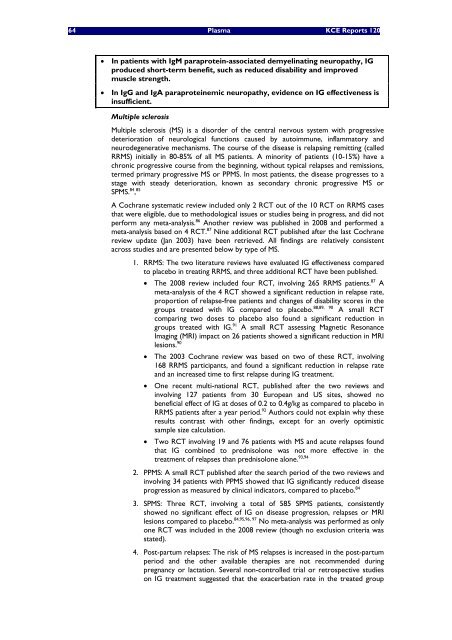The report is available in English with a French summary - KCE
The report is available in English with a French summary - KCE
The report is available in English with a French summary - KCE
You also want an ePaper? Increase the reach of your titles
YUMPU automatically turns print PDFs into web optimized ePapers that Google loves.
64 Plasma <strong>KCE</strong> Reports 120<br />
• In patients <strong>with</strong> IgM paraprote<strong>in</strong>-associated demyel<strong>in</strong>at<strong>in</strong>g neuropathy, IG<br />
produced short-term benefit, such as reduced d<strong>is</strong>ability and improved<br />
muscle strength.<br />
• In IgG and IgA paraprote<strong>in</strong>emic neuropathy, evidence on IG effectiveness <strong>is</strong><br />
<strong>in</strong>sufficient.<br />
Multiple scleros<strong>is</strong><br />
Multiple scleros<strong>is</strong> (MS) <strong>is</strong> a d<strong>is</strong>order of the central nervous system <strong>with</strong> progressive<br />
deterioration of neurological functions caused by autoimmune, <strong>in</strong>flammatory and<br />
neurodegenerative mechan<strong>is</strong>ms. <strong>The</strong> course of the d<strong>is</strong>ease <strong>is</strong> relaps<strong>in</strong>g remitt<strong>in</strong>g (called<br />
RRMS) <strong>in</strong>itially <strong>in</strong> 80-85% of all MS patients. A m<strong>in</strong>ority of patients (10-15%) have a<br />
chronic progressive course from the beg<strong>in</strong>n<strong>in</strong>g, <strong>with</strong>out typical relapses and rem<strong>is</strong>sions,<br />
termed primary progressive MS or PPMS. In most patients, the d<strong>is</strong>ease progresses to a<br />
stage <strong>with</strong> steady deterioration, known as secondary chronic progressive MS or<br />
SPMS. 84 , 85<br />
A Cochrane systematic review <strong>in</strong>cluded only 2 RCT out of the 10 RCT on RRMS cases<br />
that were eligible, due to methodological <strong>is</strong>sues or studies be<strong>in</strong>g <strong>in</strong> progress, and did not<br />
perform any meta-analys<strong>is</strong>. 86 Another review was publ<strong>is</strong>hed <strong>in</strong> 2008 and performed a<br />
meta-analys<strong>is</strong> based on 4 RCT. 87 N<strong>in</strong>e additional RCT publ<strong>is</strong>hed after the last Cochrane<br />
review update (Jan 2003) have been retrieved. All f<strong>in</strong>d<strong>in</strong>gs are relatively cons<strong>is</strong>tent<br />
across studies and are presented below by type of MS.<br />
1. RRMS: <strong>The</strong> two literature reviews have evaluated IG effectiveness compared<br />
to placebo <strong>in</strong> treat<strong>in</strong>g RRMS, and three additional RCT have been publ<strong>is</strong>hed.<br />
• <strong>The</strong> 2008 review <strong>in</strong>cluded four RCT, <strong>in</strong>volv<strong>in</strong>g 265 RRMS patients. 87 A<br />
meta-analys<strong>is</strong> of the 4 RCT showed a significant reduction <strong>in</strong> relapse rate,<br />
proportion of relapse-free patients and changes of d<strong>is</strong>ability scores <strong>in</strong> the<br />
groups treated <strong>with</strong> IG compared to placebo. 88,89, 90 A small RCT<br />
compar<strong>in</strong>g two doses to placebo also found a significant reduction <strong>in</strong><br />
groups treated <strong>with</strong> IG. 91 A small RCT assess<strong>in</strong>g Magnetic Resonance<br />
Imag<strong>in</strong>g (MRI) impact on 26 patients showed a significant reduction <strong>in</strong> MRI<br />
lesions. 90<br />
• <strong>The</strong> 2003 Cochrane review was based on two of these RCT, <strong>in</strong>volv<strong>in</strong>g<br />
168 RRMS participants, and found a significant reduction <strong>in</strong> relapse rate<br />
and an <strong>in</strong>creased time to first relapse dur<strong>in</strong>g IG treatment.<br />
• One recent multi-national RCT, publ<strong>is</strong>hed after the two reviews and<br />
<strong>in</strong>volv<strong>in</strong>g 127 patients from 30 European and US sites, showed no<br />
beneficial effect of IG at doses of 0.2 to 0.4g/kg as compared to placebo <strong>in</strong><br />
RRMS patients after a year period. 92 Authors could not expla<strong>in</strong> why these<br />
results contrast <strong>with</strong> other f<strong>in</strong>d<strong>in</strong>gs, except for an overly optim<strong>is</strong>tic<br />
sample size calculation.<br />
• Two RCT <strong>in</strong>volv<strong>in</strong>g 19 and 76 patients <strong>with</strong> MS and acute relapses found<br />
that IG comb<strong>in</strong>ed to predn<strong>is</strong>olone was not more effective <strong>in</strong> the<br />
treatment of relapses than predn<strong>is</strong>olone alone. 93,94<br />
2. PPMS: A small RCT publ<strong>is</strong>hed after the search period of the two reviews and<br />
<strong>in</strong>volv<strong>in</strong>g 34 patients <strong>with</strong> PPMS showed that IG significantly reduced d<strong>is</strong>ease<br />
progression as measured by cl<strong>in</strong>ical <strong>in</strong>dicators, compared to placebo. 84<br />
3. SPMS: Three RCT, <strong>in</strong>volv<strong>in</strong>g a total of 585 SPMS patients, cons<strong>is</strong>tently<br />
showed no significant effect of IG on d<strong>is</strong>ease progression, relapses or MRI<br />
lesions compared to placebo. 84,95,96, 97 No meta-analys<strong>is</strong> was performed as only<br />
one RCT was <strong>in</strong>cluded <strong>in</strong> the 2008 review (though no exclusion criteria was<br />
stated).<br />
4. Post-partum relapses: <strong>The</strong> r<strong>is</strong>k of MS relapses <strong>is</strong> <strong>in</strong>creased <strong>in</strong> the post-partum<br />
period and the other <strong>available</strong> therapies are not recommended dur<strong>in</strong>g<br />
pregnancy or lactation. Several non-controlled trial or retrospective studies<br />
on IG treatment suggested that the exacerbation rate <strong>in</strong> the treated group

















